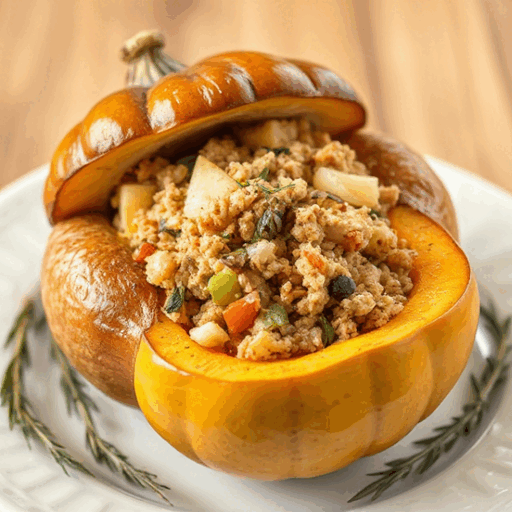Garlic and Herb Roasted Carrots
These herb-roasted carrot sticks are a delightful combination of crispy…

When it comes to anti-inflammatory eating, the foods we choose and the way we prepare them play a significant role in either supporting or challenging our health. This pumpkin custard dish, a warm and comforting treat, is not just indulgent—it’s carefully crafted with ingredients that can help reduce inflammation and promote overall well-being. Let’s take a deep dive into its ingredients and preparation, exploring how each contributes to (or detracts from) an anti-inflammatory lifestyle.
Ingredient Analysis: Supporting or Challenging Inflammation?
Pumpkin Puree (1 cup): Pumpkin is a nutritional powerhouse and an anti-inflammatory favorite. Its bright orange color signals its richness in beta-carotene, an antioxidant that the body converts into vitamin A. This helps reduce inflammation, boost immunity, and promote skin health. Additionally, pumpkin’s high fiber content supports a healthy gut microbiome, essential for reducing chronic inflammation.
Pro Tip: Use 100% pure, organic pumpkin puree without added sugars or preservatives. Non-organic options may contain pesticide residues that could trigger inflammation.
Cinnamon (1 teaspoon): Cinnamon is a well-known anti-inflammatory spice. It contains antioxidants that help reduce inflammation markers, particularly in people with metabolic conditions. Choose Ceylon cinnamon, which has lower levels of coumarin (a compound in cassia cinnamon that can be harmful in high doses) for safer and more effective benefits.
Ginger (1/4 teaspoon): Ginger’s anti-inflammatory properties are largely due to its active compound, gingerol. It helps reduce muscle pain, soothe gastrointestinal discomfort, and fight inflammation at the cellular level. Even a small amount in this dish contributes to its overall anti-inflammatory benefits.
Nutmeg (2 fresh grates): Nutmeg, while often used sparingly, offers mild anti-inflammatory and antioxidant benefits. Its compounds help neutralize free radicals, protecting cells from damage. However, nutmeg should always be used in small quantities, as larger amounts can lead to adverse effects due to its myristicin content.
Salt (A small pinch): Salt is a necessary flavor enhancer, but its impact on inflammation depends on the type and quantity used. A small pinch of Himalayan or sea salt adds trace minerals without the inflammatory effects of refined table salt. Excess salt consumption, however, can lead to water retention and increased blood pressure, which may exacerbate inflammation.
Free-Range Eggs (2 large): Eggs are a nutrient-dense food, providing high-quality protein and essential nutrients like choline, which supports brain health. However, eggs can be inflammatory for individuals sensitive to egg whites or those with autoimmune conditions. For those who tolerate eggs, they are an excellent addition to this dish, contributing structure and a rich nutrient profile.
Coconut Milk or Coconut Cream (1 cup): Coconut milk is a fantastic anti-inflammatory ingredient. It contains medium-chain triglycerides (MCTs), which are easily absorbed by the body and used for energy. Lauric acid, a compound in coconut, has both antimicrobial and anti-inflammatory properties. Opting for BPA-free, unsweetened coconut milk ensures you’re avoiding unnecessary additives.
Maple Syrup or Honey (1 tablespoon): Both maple syrup and honey are natural sweeteners with lower glycemic indices compared to refined sugar. They provide trace nutrients and antioxidants but should still be used sparingly, as excessive sugar consumption can increase inflammation. For this recipe, the single tablespoon strikes a balance between flavor and health.
Vanilla Extract (1 teaspoon, AIP compliant): Vanilla extract is a neutral-to-anti-inflammatory ingredient, offering mild antioxidant properties. Ensure you choose an AIP-compliant, alcohol-free variety to maintain the dish’s anti-inflammatory integrity.
Cooking Method: A Gentle Approach
This recipe’s preparation method is ideal for preserving the anti-inflammatory potential of its ingredients. Baking the custard at 350°F (175°C) avoids the creation of harmful compounds like advanced glycation end products (AGEs), which can form at higher cooking temperatures. Additionally, using a water bath ensures even cooking, preventing overbaking and nutrient loss.

When prepared with high-quality, minimally processed ingredients, this pumpkin custard is a strongly anti-inflammatory dish. Its nutrient-dense profile, gentle cooking method, and thoughtful ingredient selection make it a delicious and nourishing option for those following an anti-inflammatory or autoimmune-friendly diet.
Tips to Maximize Anti-Inflammatory Benefits:
This dish proves that comfort foods can be both indulgent and health-promoting when crafted mindfully. Enjoy every spoonful knowing you’re supporting your body with each bite.
These herb-roasted carrot sticks are a delightful combination of crispy…
This bacon-wrapped asparagus recipe combines the earthy flavor of asparagus with the crispy, smoky goodness of bacon. It’s a nutrient-dense,…
This turkey-stuffed acorn squash recipe is a hearty and flavorful dish that combines the natural sweetness of roasted squash with…
This crispy coconut shrimp paired with a refreshing mango salsa is a flavor-packed dish perfect for those seeking a healthy,…
These crispy sweet potato toasts are a delicious and nutrient-packed alternative to traditional bread-based snacks. Perfectly seasoned with garlic, onion,…
This coconut-crusted cod recipe is a delightful way to enjoy a nutritious and flavorful meal that aligns with an anti-inflammatory…
This lemon garlic shrimp with zucchini and bell peppers is a quick, flavorful dish perfect for weeknight dinners or as…
These crispy baked chicken wings are perfectly seasoned with a blend of aromatic spices and baked to golden perfection. With…
These herb-roasted carrot sticks are a delightful combination of crispy edges and tender centers, making them a flavorful and nutritious…
This pumpkin spice bread is a moist, flavorful loaf that’s perfect for satisfying your cravings while supporting an anti-inflammatory lifestyle.…
copyright © 2025 Anti-Inflammatory Approach. All rights reserved. Unauthorized reproduction, distribution, or use of any content, including text, images, recipes, or other materials on this website, is strictly prohibited without prior written permission. This website’s content is provided for informational purposes only and does not constitute medical or professional advice.


This $1 anti-inflammatory cookbook is packed with simple, tasty recipes to reduce inflammation and improve energy. Don’t miss out—get it now on Amazon!